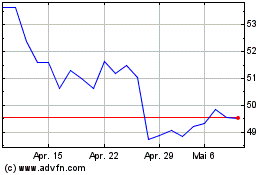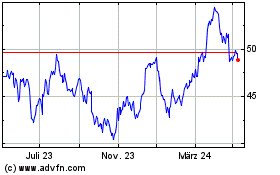BASF to Give More Autonomy to Battery Materials, Agricultural Units
07 Dezember 2023 - 2:36PM
Dow Jones News
By Pierre Bertrand and Helena Smolak
BASF intends to adapt the operating model of its battery
materials and agricultural units, a move that faces opposition from
German trade union IG Bergbau, Chemie, Energie.
The move seeks to boost profitability in those units by granting
them the space to adjust their models and processes, the company
said.
BASF said that it will also apply its new business approach to
its coatings unit to meet the needs of their specific customer
industries.
"We are combining the benefits of a more differentiated approach
to steering individual businesses with the advantages provided by
the Verbund and our setup as an integrated company," Chief
Financial Officer Dirk Elvermann said in a statement Thursday.
The change will be supported by adapted IT and governance
frameworks, BASF said.
Germany's IGBCE union, in a statement, said that BASF will spin
off the three businesses and that they will transferred to legally
independent units.
The IGBCE added the process is to be completed by 2026 and,
though the move isn't expected to cause employee redundancies, its
benefits and risks were unclear.
"We did not wish for a spin-off of parts of the company's
business units", Sinischa Horvat, works council chair.
A BASF spokesperson said the units will remain an integrated
part of the group, but will be given more freedom in their
management. Employees will be transferred to the newly established
units, the spokesperson said.
BASF will continue to apply its integrated Verbund business
model comprising its chemicals, materials, industrial solutions and
nutrition and care units, but with a much tighter focus on resource
use, the company said.
The company said that it intends to generate value by bundling
demand and through synchronized and deeply integrated
production.
The disclosure of the differentiated steering approach, came as
the company also said Thursday that it plans to reduce its scope
3.1 emissions--those from the production of purchased goods and
services--by 15% relative to 2022, by 2030.
BASF said that it will reduce emissions to 1.34 kilograms of
carbon-dioxide equivalent per kilogram of raw material bought,
compared with 1.57 previously.
It added that it targets an earnings before interest taxes
depreciation and amortization margin of 17% for its Verbund
businesses, 30% or higher for its battery materials unit by 2030,
15% or higher in the midterm for its coating unit, and 23% or
higher for its agricultural solutions unit.
Write to Pierre Bertrand at pierre.bertrand@wsj.com and Helena
Smolak at helena.smolak@wsj.com
(END) Dow Jones Newswires
December 07, 2023 08:21 ET (13:21 GMT)
Copyright (c) 2023 Dow Jones & Company, Inc.
BASF (TG:BAS)
Historical Stock Chart
Von Apr 2024 bis Mai 2024

BASF (TG:BAS)
Historical Stock Chart
Von Mai 2023 bis Mai 2024
